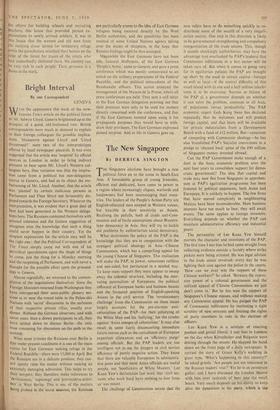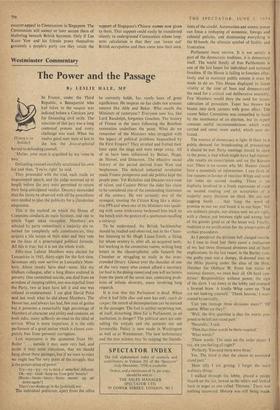The New Singapore
By DERRICK SINGTON
THE Singapore 'elections have brought a new political ,force on to the scene in South-East Asia. A formidable group of young lronsides, efficient and dedicated, have come to power in a region where increasingly cliques, warlords and landowners had been mismanaging their coun- tries. The leaders of the People's Action Party are English-educated men steeped in Western values, but irascible in their sensitivity as Asians. Realising the pitfalls, both of crude anti-Com- munism and of facile assumptions about Western- type democracy in Asia, they will try to tackle old problems by authoritarian social democracy.
What determines the policy of the PAP is the knowledge that they are in competition with the strongest political ideology in Asia—Chinese Communism, which has a compelling appeal for the young Chinese of Singapore. This realisation will make the PAP, in power, sometimes ruthless and one-sided, but puritanical in a needed way. To keep mass support they must appear to sweep away the colonial structure, including the ener- vating paternalism of Europeans, the political influence of European banks and business houses and the favoured position of English-speaking Asians in the civil service. The 'revolutionary challenge' from the Communists on these issues largely accounts for the pre-election anti- colonialism of the PAP—for their pillorying of the White Man and his 'bullying,' for the tirades against 'Asian stooges of colonialism.' It may also result in some fairly disconcerting immediate future moves such as the curtailment of European expatriate allowances and an 'efficiency purge' among officials. But the PAP leaders are too intelligent not to see the dangers to civil service efficiency of purely negative action. They know that there are valuable Europeans in administra- tive posts and that most Asian officials are useful people, not 'bootlickers of White Masters.' Lee Kuan Yew's declaration last week that 'civil ser- vants who work hard have nothing to fear from us' was meant. '
The challenge of Communism means that the new rulers have to do something quickly to re- distribute some of the wealth of a very ihegali- tarian society. One step in this direction is likely to be governmental strengthening and compulsory reorganisation of the trade unions. This, though it sounds shockingly authoritarian, may have the advantage (not overlooked by PAP's leaders) that Communist infiltration in a key sector will be taken care of. But when it comes to going very far in egalitarian policies the PAP are brought up short by the need to attract capital—foreign as well as local—if the central difficulty of this small island with its one and a half million inhabi- tants is to be overcome. Success or failure of the PAP as a government depends on whether it can solve the problem, common to all Asia, of population versus productivity. The PAP economic expert Goh Kcng Swce has declared repeatedly that he welcomes and will protect foreign capital, and that loans will be available for private industrialists from a Development Board with a fund of £12 million. But—conscious of competing with Communist ideology—he has I also brandished PAP's Socialist convictions in a pledge to 'channel back' some of the £90 million of Singapore money invested abroad.
Can the PAP Government make enough of a dent in the basic economic problem over the next four years to consolidate support for demo- cratic government? The idea that' capital and trade may now flee from Singapore in apprehen- sion at PAP's egalitarian programme has been fostered by political opponents, both Asian and European. It is unlikely to happen. The few firms that have moved completely to neighbouring Malaya have been inconsiderable. Most business interests have too much to lose; they will await events. The same applies to foreign investors. Everything depends on whether the PAP can maintain administrative efficiency and industrial peace.
The personality of Lee Kuan Yew himself mirrors the character and intentions of the PAP.
The first time I met him he had come straight from collecting evidence outside a factory where strike pickets were being arrested. He was legal advisor to the trade union involved; every day he was fighting their case against the police in the courts. 'How can we ever win the • support of these Chinese workers?' he asked. 'Between the repres- sive power of a colonial government and the militant appeal of Chinese Communism we just don't come in.' But he has won the support of Singapore's Chinese masses, and without making any Communist appeal. He has purged the PAP of Communist infiltrators by instituting a tight scrutiny of new entrants and limiting the rights of party members to vote in the election of officers.
Lee Kuan Yew is a mixture of exacting puritan and genial liberal. I met him in London
on the day when Khrushchev and Bulganin were driving through the streets. He slapped his hand down on the front page of a daily newspaper. It carried the story of Grace Kelly's wedding in giant type. 'What's happening in this country?' he asked grimly. 'Are people just not interested in
the Russian leaders' visit?' Yet he is an inveterate golfer, and I have discussed the London theatre with him over tankards of beer into the small. hours. Very much depends on his ability to keep alive the dynamism in his party, which is the counter-appeal to Communism in Singapore. The Communists will sooner or later accuse them of sheltering beneath British bayonets. Only if Lee Kuan Yew and his friends prove themselves genuinely a people's party can they retain the support of Singapore's Chinese masses now given to them. That support could easily be transferred silently to underground Communists whose long- term calculation is that they can 'sweat out' British occupation and then come into their own.







































 Previous page
Previous page